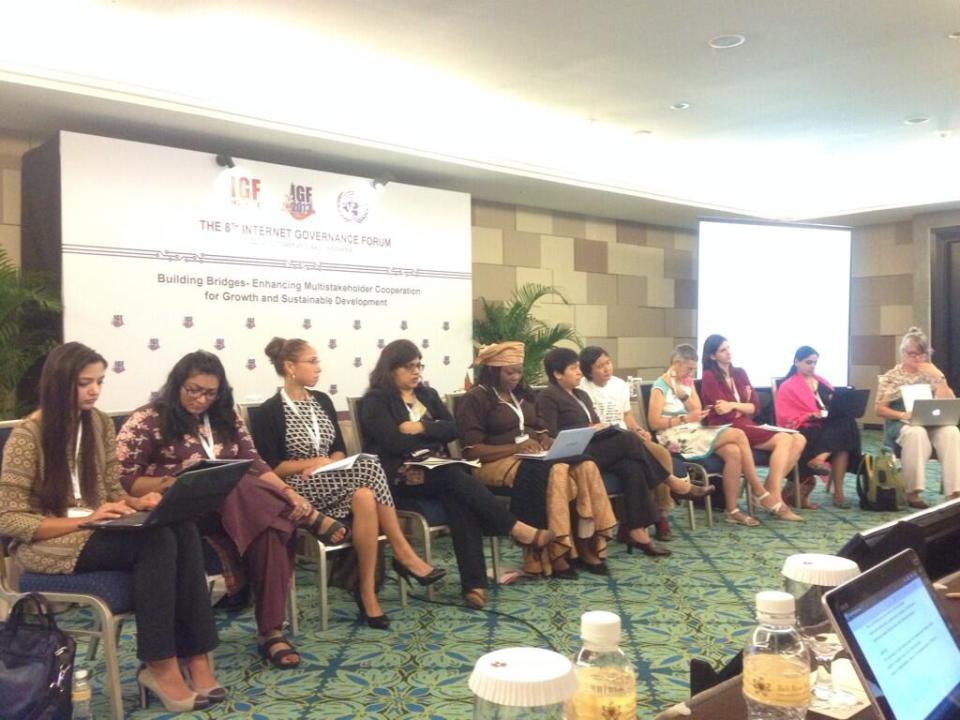
The technology-related violence on women research meeting took place in Bali, Indonesia from 19th to 21st October 2013. The meeting was organized by the Association for Progressive Communication (APC), as part of the Ending violence: Women’s rights and safety online project with support from the Dutch government’s Funding Leadership and Opportunities for Women (FLOW) programme.
The meeting was attended by partners in the technology-related research team which include IAWRT Kenya, Mexico, Philippines, Pakistan, Bosnia-Herzegovina, Democratic Republic of Congo and Columbia. The seven partners will be engaged in case studies mapped online/offline on technology-related violence committed against women. This follows a baseline survey carried out by APC in 2009-2011 in 12 countries in Africa, Asia and Latin America, which showed there was growing incidence of technology-related violence against women, the most common being cyber stalking, sexual harassment, privacy violations, surveillance and the unauthorized use and manipulation of personal information including images and videos. The study also found that despite increased violations, the policies, regulations or services to address such violence in the 12 countries, do not exist or are inadequate; making women and girls more vulnerable.
There is need to examine the effectiveness of existing legal and other remedies for victims/survivors of technology-related forms of violence against women (VAW). The research findings can be used as a lobby to having Internet intermediaries, service providers and respective government organizations/agencies to reinforce/formulate policies to address information and communication technology (ICT) related violence cases.
IAWRT Kenya among other partners, will participate by researching on identified technology-related violence for example, hate speech via, short message services or harassment, cyber stalking, perpetuated through social media such as Facebook, twitter and blogs. The input, from Kenya as well as the other six countries will contribute to the overall research project by APC whose findings maybe useful to forums such as Internet Governance Forum currently debating on how the internet can be governed.
The research meeting was followed closely by the Internet Governance Forum workshops, “building bridges: enhancing multi-stakeholder cooperation for growth and sustainable development”, from 22nd to 25th October. IAWRT was once again represented at the forum with support from APC.
Key issues discussed focused on emerging cyber security threats and how governments as partners in multi-stake cooperation are becoming aware of the increased use of the internet and imminent security threats which some governments respond to by blocking specific websites or instituting laws which can be used to charge offenders. Online surveillance by respective agencies of governments has therefore increased, raising concerns on positive role of Governments as multi-stake holders in internet governance. Internet activists in countries like India, China, Pakistan and Indonesia conclude that management of internet governance must involve collaboration between government and civil society organization for a better, fair, and fulfilling aspiration of internet governance with frameworks that deal with diverse issues such as allowing freedom of expression. One of the sources that reflect the internet governance as a topic
for debate is the usage of social media.
As governments work on legislations, gender mainstreaming in ICT sector should not be overlooked. Women need to access internet for development, hence training of women and girls to access internet is crucial. Despite this, gender was not seen as a thematic area during IGF 2013 and hence was not included in the IGF workshops. This was a concern to women human rights organizations like APC which advocates for a democratic and inclusive internet governance models.
The Gender Dynamic Coalition organized by APC to discuss Gender and Internet Governance: integrating women’s rights at the IGF space, was part of a concern to address strategy for inclusion of gender discussion in future IGF. Some of the suggestions included organizing gender forum at national levels, for example, in Africa, Asia and Latin America and consolidating thoughts for consideration. Kenya was quoted as one of the African countries at the forefront with gender issues which could form part of the national level discussions. Some of the thoughts could emanate from media groups already having gender agenda. A pre-event to concretize the gender issues was also viewed as a viable way forward. It was also noted that IGF 2013 was dominated by technical discussions such as use of the internet and surveillance hence the relegation of gender issues.
Gender issues are always big stories and it is incumbent upon women rights groups to participate in terms of diversity to make decisions on issues which can influence themes on IGF. People who are not represented in access of internet lose out on political information and therefore cannot engage in public participation. Repressive laws and cultural barriers in countries such as Pakistan, as well as language barriers due to illiteracy levels, hinder women to access internet as a platform to share their opinions. Human rights lobby groups, for example in Indonesia, support women to seek justice on internet rights. Mainstreaming gender in ICT and overcoming barriers Information and technology courses for young girls, according to Sheryl Miller, Director Public Policy, Unites States, can overcome illiteracy barrier. This is one way of mainstreaming gender in ICT. It can enhance democratic processes of freedom of expression for the women and girls as exemplified in Southeast Asian Press Alliance (democracy group) which has built the capacity of women to express themselves as bloggers among other freedoms. With such freedom, harassment of women online has been noted as a challenge. But these are the problems of internet use and cyber security which IGF has to grapple with. This is an indication that gender and women’s rights issues must have a forum at IGF.
The launch of publications on internet rights, gender and ICTs of women’s rights and security project, “EROTICS”:http://www.apc.org/en/projects/erotics-exploratory-research-project-sex…, in Indonesia by APC is part of women rights groups to sound out the need for women to access the internet to bridge the digital divide.
- 9509 views






Add new comment